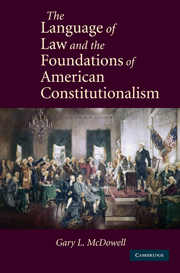Book contents
- Frontmatter
- Contents
- Preface and Acknowledgments
- The Language of Law and the Foundations of American Constitutionalism
- Introduction: The Politics of Original Intention
- 1 The Constitution and the Scholarly Tradition: Recovering the Founders' Constitution
- 2 Nature and the Language of Law: Thomas Hobbes and the Foundations of Modern Constitutionalism
- 3 Language, Law, and Liberty: John Locke and the Structures of Modern Constitutionalism
- 4 The Limits of Natural Law: Modern Constitutionalism and the Science of Interpretation
- 5 The Greatest Improvement on Political Institutions: Natural Rights, the Intentions of the People, and Written Constitutions
- 6 Chains of the Constitution: Thomas Jefferson, James Madison, and the “Political Metaphysics” of Strict Construction
- 7 The Most Sacred Rule of Interpretation: John Marshall, Originalism, and the Limits of Judicial Power
- 8 The Same Yesterday, Today, and Forever: Joseph Story and the Permanence of Constitutional Meaning
- Epilogue: The Moral Foundations of Originalism
- Index of Cases
- General Index
- References
8 - The Same Yesterday, Today, and Forever: Joseph Story and the Permanence of Constitutional Meaning
Published online by Cambridge University Press: 05 June 2012
- Frontmatter
- Contents
- Preface and Acknowledgments
- The Language of Law and the Foundations of American Constitutionalism
- Introduction: The Politics of Original Intention
- 1 The Constitution and the Scholarly Tradition: Recovering the Founders' Constitution
- 2 Nature and the Language of Law: Thomas Hobbes and the Foundations of Modern Constitutionalism
- 3 Language, Law, and Liberty: John Locke and the Structures of Modern Constitutionalism
- 4 The Limits of Natural Law: Modern Constitutionalism and the Science of Interpretation
- 5 The Greatest Improvement on Political Institutions: Natural Rights, the Intentions of the People, and Written Constitutions
- 6 Chains of the Constitution: Thomas Jefferson, James Madison, and the “Political Metaphysics” of Strict Construction
- 7 The Most Sacred Rule of Interpretation: John Marshall, Originalism, and the Limits of Judicial Power
- 8 The Same Yesterday, Today, and Forever: Joseph Story and the Permanence of Constitutional Meaning
- Epilogue: The Moral Foundations of Originalism
- Index of Cases
- General Index
- References
Summary
The death of Chief Justice John Marshall on July 6, 1835, left Joseph Story, his closest judicial colleague, in “wretched spirits.” While there were rumors that Story might succeed Marshall to the chief justiceship (a hope Marshall clearly harbored), Story himself insisted that he “never for a moment imagined” such would be the case, thus leaving him “equally beyond hope or anxiety.” Story was too politically shrewd to delude himself into thinking that President Andrew Jackson would somehow bestow such an honor on him, whatever his own secret hopes truly might have been. Their constitutional views were too widely separated, and the president had made clear, as Story's son would later recall, that the “school of Story and Kent…could hope for but little favor at his hands.” It was no surprise when Jackson filled Marshall's seat with a true Jacksonian, his own former attorney general and secretary of the treasury, Roger Brooke Taney of Maryland. From that moment, Story would increasingly come to see himself as “the last of the old race of judges.”
Amid his own considerable personal grief, it fell to Story publicly to remember and to eulogize his great friend, stalwart colleague, and influential mentor; and he did so in a way that could only have confirmed Jackson's confidence in his own political instincts. Marshall, Story told the assembled members of the Suffolk bar on October 15, 1835, was not merely “the highest boast and ornament of the [legal] profession,” but was as near “perfect” a man as Story had ever known, characterized as the late chief justice was by “a rare combination of virtues.”
- Type
- Chapter
- Information
- Publisher: Cambridge University PressPrint publication year: 2010

